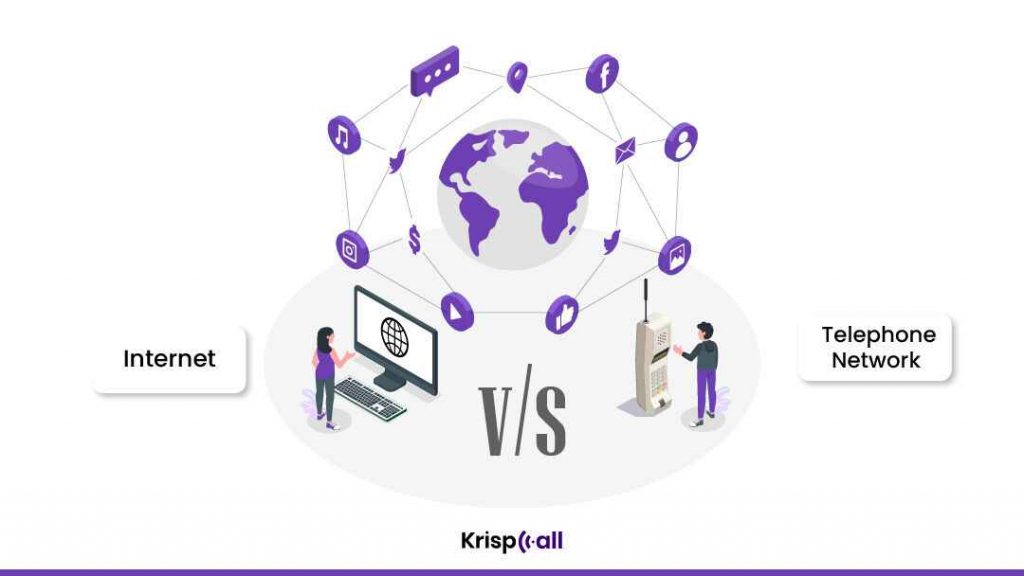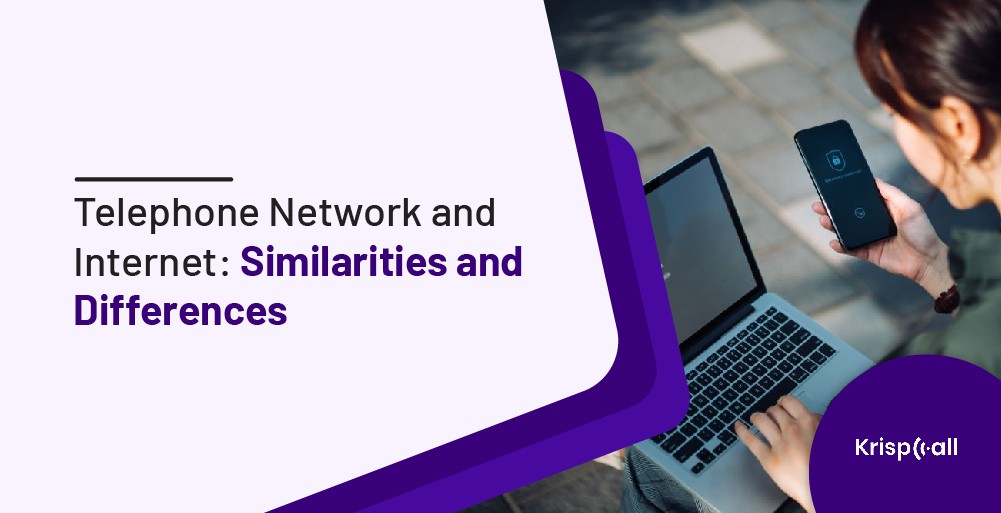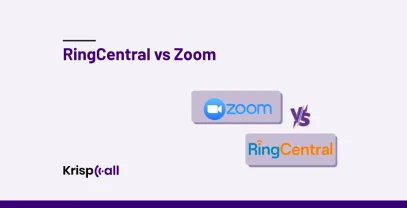Which one to prefer between Telephone Network Vs Internet? Why they are different?
Telephone networks use analog as well as digital techniques to conduct audio calls. Whereas, the Internet is the network of networks that only relies on digital techniques. Internet is more than just for Wi-Fi calling.
In this article, you will get to know the differences and similarities between the telephone network and the Internet. You will get to know how telephone networks & the internet work, their type, or their pros & cons.
Stay connected till the end to get every knowledge regarding telephone network & internet.
What is a Telephone Network?
A telephone network refers to a telecommunication network that links the telephones to perform voice calls or telephone calls between two or more persons and is thought to be the first electronic network.
Telephone networks frequently employ analog techniques, which differs from the digital technology employed by computer-based networks.
Now often, it also offers new functions like Internet & Fax.
How does the Telephone Network work?
A modem is necessary whenever a computer or terminal is linked to the telephone line since the telephone network delivers analog data.
The modem then translates digital data from a computer to an analog signal that gets delivered over a telecommunication connection, and then back to computer data.
Traditionally, there have been 2 separate specialties:
Switching: Switching is the process of selecting and directing communication signals to a single user or a group of users.
Transmission: Transmission helps transport signals from the source to the far-end user in a reliable manner.
Simply, a Telephone network uses a transmission medium to connect a source to a destination.
A basic telephone speaker, keyboard, monitor, or another device could be the source & destination. A transmission medium can be considered as either a single electrical medium or a series of electrical media.
What are the types of Telephone Networks?
The different types of telephone networks are:
Public Switched Telephone Network (PSTN)
PSTN is known as a landline network in which all phones are connected simply to a single telephone exchange. Audio calls can be made over the traditional telephone network using analog telephone connections.
Integrated Services Digital Network (ISDN)
ISDN refers to a collection of communication protocols that allow audio, video, information, & other communications network services to be transmitted across the PSTN’s digitalized circuits.
The Integrated Services Digital Network (ISDN) connects the traditional analog network (PSTN) with digital capabilities.
As a result, voice lines can be leveraged to provide users with additional services, like internet access.
It’s also worth mentioning that old technology is mostly being phased out in favor of more current technologies.
VoIP
Voice-over-IP (VoIP) connections allow users to perform phone calls via the Internet. VoIP solutions like cloud telephony give customers all the features of a traditional phone system while also taking advantage of the Internet’s benefits.
VoIP makes ISDN and the entire PSTN network ineffective by allowing voice calls to be made across the internet service.
Advantage of Telephone Networks
The pros of telephone networks are:
- It is simple and simple to use.
- Since it is a circuit-switching network, each and every recipient can be chosen, and there is almost no transmission latency.
- It is available at a low cost because it is extensively supplied.
- It’s simple to share ideas and information over the telephone or fax.
- Accessible from anywhere in the world.
- And many more…
Those are some of the advantages of a telephone network.
Disadvantages of Telephone Network
The cons of the telephone network are:
- The connection process takes a long time. Before the line is linked to the recipient, it must first be dialed up.
- Its transmission speed is slow.
- The connection strength is insufficient for data transfer, hence high-speed data transfer is not possible.
What is the Internet?
The term “Internet” refers to a worldwide network of networks that communicate with one another by utilizing the internet protocol.
It’s a combination of domestic to worldwide personal, social, educational, industrial, and political networks integrated by a number of electrical, wireless, and optical communication networks.
It has such a broad and strong capacity, which is used for nearly any information-based purpose, and it is available to anybody who accesses its representative network.
How does the Internet work?
The internet is an international network that interconnects connecting devices and sends large amounts of data and information. It operates based on an Internet Protocol (IP) & Transport Control Protocol (TCP) packet routing network.
TCP & IP cooperate together to guarantee that data is sent across the internet in a consistent and secure manner, regardless of the device or location.
The Internet functions because web protocols enable any network to communicate with any other network.
That’s what allows anybody to communicate, publish information, provide services, and sell items without the requirements of approval from anyone.
It develops a fair system for all & is the reason why we now have such a diverse range of software and services.
What are the types of Internet?
The different types of internet connections are:
Broadband
Fiber or telephone providers supply this fast Internet service. Broadband Internet is among the quickest solutions available, as it sends massive amounts of data over several data channels.
DSL and Cable Internet connectivity are examples of high-bandwidth connectivity.
- DSL
DSL (Digital Subscriber Connection) leverages a home’s existing 2-wire copper telephone line to offer service simultaneously as a landline phone. - Cable
A cable Internet line is used to deliver broadband access. When using cable TV lines to utilize the internet, a cable modem should be used.Many people find that cable modems give incredibly fast Internet connectivity, implementing a cable line is a practical choice.
Satellite
A satellite Internet service could be provided in such places where a broadband link is still not provided. A modem is used for satellite connectivity, the same as it is for wireless connectivity.
Wi-Fi Hotspot
Wifi Hotspots are locations that provide Internet connectivity across a WLAN that is connected to an Internet connection supplier via a router.
WiFi hotspots use wireless signals to link electrical devices to the Internet or exchange data. Hotspots could be phone-based or stand-alone, commercialized, or public-access.
Mobile
Voice plans with Internet connectivity are available from a variety of mobile phone and smartphone companies.
ISDN
ISDN helps to transfer information, audio, and videos via regular or digital telephone lines. Both the user and the Internet connection supplier must set up an ISDN adaptor for transmission.
Advantages of Internet Connection
We can utilize & enjoy the various benefits offered by the Internet. Some of the pros of internet connection are:
- Offers communication & collaboration between or among the people to share ideas & information.
- You can learn & get information regarding any topics.
- The Internet can be used for entertainment purposes as well.
- It offers cloud computing & cloud storage.
- Earning money via trading.
- And many more…
Those are just some of the advantages of an internet connection among thousands of benefits.
Disadvantages of Internet Connection
We can enjoy thousands of benefits of the internet. However, some of the cons of internet connection are:
- Addiction, as well as being a time-waster and a source of distractions.
- Cyberbullying
- Pornography
- Spam
- Hacking
Those are some of the disadvantages of internet connection as well as the dark side of the internet. Children, as well as adults, should be away from these drawbacks of the internet.
Similarities and Differences between Telephone Network and Internet
Telephone networks and Internet have various differences. Even though at some point, they are similar.
Similarities between the telephone network and the internet
The internet and telephone networks are both switched networks, with circuit and packet switching.
Communication can take place on the internet & telephone network through a cable or wirelessly.
Both internet & telephone networks are public networks or network service providers.
Both offer end-to-end data transmission.
Difference between telephone and internet

The comparison of telephone networks and Intenet are:
| Factors | Telephone Network | Internet |
| Terminal | Telephone, Modem | PC, Workstation, Mobile, PDAs, … |
| Bandwidth Necessary | Static (64 Kbps) | Dynamic (Kbps-Mbps) |
| Application (Content) | voice | Data: voice, file, image, video, message. |
| Transmission | Loop: UTC
Trunk: Optical Fiber |
Access: UTP, Coaxial cable, …
Trunk: Coaxial cable, Optical fiber |
| Network Elements | CPE, Switch, Mux, Cross Content | Hub, Switch, Bridge, Router |
| Switching Approach | Circuit Switching | Connectionless Packet Switching |
| Routing | Route selected during call setup | Each packet routed independently |
| Multiplexing | Circuit Multiplexing | Packet Multiplexing |
| Transmission System | Analog & Digital | Digital |
Winding Up: Telephone Network Vs Internet
Telephone network & Internet both are two different network providers. The telephone network is the first electronic network, whereas the Internet is the leading network service provider at present.
Both telephone networks & the internet are public networks, but there are a lot of differences. The techniques to provide networks are different.
Both telephone networks & the internet can be used as a communication medium, but the Internet is better. Because the Internet is an improvement & alternative to telephone networks with a variety of added features.
Telephone networks just focus on voice, whereas the Internet allows transmission of all kinds of data such as voice, audio, video, file, images, and so on.
The Internet has more advanced solutions than the Telephone Network. Using the Internet, you can learn, share, call, collaborate, earn & so on. Whereas, the telephone network is frequently used for making telephone calls.
However, the Internet also has more drawbacks than Telephone networks over other things. On the Internet, there is a chance of being bullied, trolled, addicted, scammed, engaged with porn, etc. Whereas, there is no chance of such things using the telephone network.
But in the sense of communication, making a call using a VoIP application like KrispCall is very effective. KrispCall Cloud Telephony helps you to perform calls over the internet. In fact, the telephone network supports VoIP as well, since it started supporting the internet.
KrispCall is the best alternative to other VoIP applications to communicate over the internet. KrispCall is more than just performing a call. Using KrispCall, you can send text messages & voice calls.
For more features & pricing plans, visit KrispCall’s official websites. You can schedule a free demo or sign up & enjoy its comprehensive cloud telephony features.
FAQ
Why Is the Internet a network?
The Internet is known as a “Network of Networks” because it is a worldwide group of networks connected by wires and telephone lines, allowing people to communicate with one another.
What are the three criteria necessary for an effective and efficient network?
The major factors that determined network as most effective & efficient are:
1. Performance
2. Reliability
3. Security
What is the difference between the Internet and WIFI?
The internet is a worldwide collection of networks that uses telephone lines, satellites, cables, or wireless connections to connect millions of computers or other devices all over the world.
Wifi is a wireless networking technology that enables smartphones, laptops, desktops, and other devices to connect to the internet or interact wirelessly with one another.
What is the best VoIP application to call over Internet?
KrispCall Cloud Telephony is the best VoIP application to conduct calls over the internet.
Do Phone needs Satellite to work?
Cell phones do not depend upon satellites for signals; instead, they use cellular towers.





